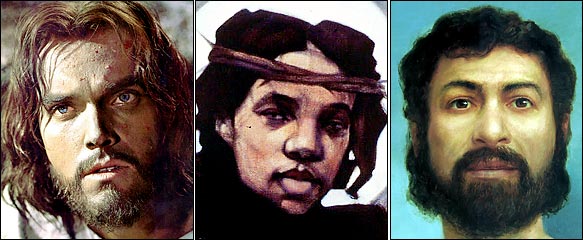But you won't hear that on the popular miniseries "The Bible"
By Chauncey DeVega
When I was an undergraduate and forced to take a series of religious studies classes as part of a core requirement, I was exposed first-hand to how volatile such a basic observation can be to some Christians and others who identify with that faith tradition. Our professor was discussing how the Bible is a historical text that has been edited and changed to reveal the prevailing political and social norms of a given time. I asked a question about the Civil Rights Movement and how black folks tried to use the text for purposes of political inspiration and motivation in the face of great adversity.
This transitioned to a followup question where I asked, “What color was Jesus?” Having just seen the movie, Malcolm X, I was curious as to the professor’s response. He looked around and plainly said that Jesus Christ was not white or European. He would likely be a medium-complected Jew with brown or darker skin.
Check and mate: thus my followup, “Could one reasonably say that Jesus the historical figure was black?”
Our masterful professor looked around in a contemplative manner and said, “Depending on who you ask, and in what context, one could say that he could be considered ‘black’ in a society like America where whites have been so color conscious and race obsessed.” You could have heard a pin hit the floor as gasps of anger erupted from the white (and some black and brown) students in the class.
Some students actually tried to get this professor fired. He was saved by a few things. First, his research claims, historiography on the matter, and credentials were impeccable. He had tenure. And he was white. It is quite likely that a black faculty member making such a basic claim would have had far fewer protections.
In these discussions of faith, some would likely object that race doesn’t matter. Who cares what color the historical Jesus is/was?
Here, the color of Jesus Christ matters while simultaneously being of little import. Thus, a paradox. If the color of Jesus Christ is unimportant, why then the objection to the question and a resistance to changing the images to be more historically accurate? Moreover, such a basic question about the lie that is white Jesus, is often deflected and redirected into one which ends with the power of the white racial frame enabling those invested in its distortion(s) of reality arguing that anyone, especially a person of color, asking such things must be a black “racist” or anti-white.
If a Christian is a true believer why would they have difficulty reconciling their faith with such a superficial thing as changing the historical lie that is white Jesus into one that is more accurate, a man of color, whose message would be unchanged? Would it really be that hard for some white Christians (and others) to kneel before a black or brown Jesus Christ? Are the psychic wages of whiteness so great as to distort a person’s image of God?
These matters of race, religion and politics remain potent even in 21st-century America. See how President Obama’s presidential campaign was almost destroyed by Reverend Wright and the white conservative bogeyman known as “black liberation theology.”
Leonardo da Vinci and Michelangelo’s White Jesus were iconic images that enabled European colonialism and imperialism. In these grand projects of global white power and conquest, “Christian” became synonymous with free, white and civilized. “Heathen” meant that whole populations could be subjected to extermination, enslavement and exploitation.
The current and most popular image of Jesus as created by Warner Sallman in 1941 depicts the former as a white “American.” Here, American exceptionalism, Manifest Destiny, and rise as an Imperial power were ordained as being one with Jesus, and a blessing from God for a country whose elites imagined it to be a “shining city on the hill.”
For more on the subject, see Conservatives Deny "Black Jesus," Genocide.
Below: White Jesus, black Jesus, and brown Jesus. The third version is probably what he actually looked like.


1 comment:
The really fun thing is that Jesus's Jewishness should be apparent in the New Testament:
*Obviously he's born in Palestine.
*Shortly thereafter, he's circumcision mention number I've lost track at this point in the Bible. (This is one of those things like how dudes' hands get chopped off in every Star Wars movie, right? Author's kink?)
*He's called "rabbi" at points. (Speculation as to censored texts about his being married and having children, go!)
*The term messiah refers to a type of hero who rescues the Jewish people from their current oppressor. (The fact that I said "current oppressor" gives you an idea of the plot of the Old Testament.)
Yet we get a whole history of denialism of this. The Nazis even had "why Christ was an Aryan" propaganda. LOL
Post a Comment